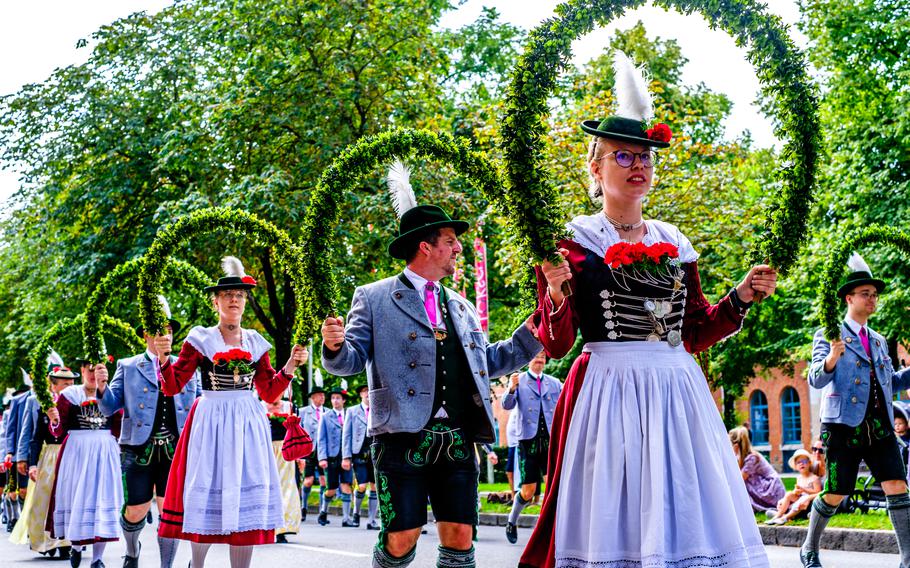
Residents participate in a traditional parade in 2023 at the Herbstfest Rosenheim celebration in Rosenheim, Germany. This year’s festivities run from Saturday to Sept. 15. (iStock)
Lately a lot of travel articles have been devoted to destination dupes, the practice of subbing out a famous tourist destination for a lesser-known city or town with similar attributes. The same principle could easily be applied to attending some of Europe’s best-known fests and mega-events. Cheaper accommodation, less inflated prices, a greater chance to meet locals and a more laid-back atmosphere are just some of the possible benefits of seeking out smaller but no less authentic activities.
Munich’s Oktoberfest vs. other autumn beer fests: The 189th edition of Munich’s famed Oktoberfest, set to unfold Sept. 21-Oct. 6 in its traditional location, the Theresienwiese, counts its visitor numbers in millions, with a record-breaking 7.2 million attendees having raised their glasses with a Prost! there in 2023.
To experience authentic Bavarian Gemütlichkeit in a less hectic setting, consider attending the Herbstfest Rosenheim, attended by “only” about 1 million fun-seekers annually. From Aug. 31-Sept. 15, visitors can enjoy much the same beer, attractions and traditionally-clad locals that lend Oktoberfest its enduring appeal. Special events on the program include the opening parade Saturday at 11 a.m. Aug. 31; reduced prices on rides on children’s days Sept. 4 and Sept. 11; a religious fest of thanksgiving at the Max-Josefs-Platz at 9:15 a.m. Sept. 8 and a display of fireworks at 9 p.m. Sept. 12. Online: herbstfest-rosenheim.de
Other traditional Bavarian autumn beerfests on the docket include Gillamoos in Absberg (through Sept. 2); Herbstfest Erding in Erding (through Sept. 8); Passauer Dult in Passau (Sept. 6-15) and Sankt-Michaelis-Kirchweih in Fürth (Sept. 28-Oct. 9).
Dürkheimer Wurstmarkt vs. smaller wine fests: It’s named after sausage, but make no mistake: at the Dürkheimer Wurstmarkt, it’s all about the wine, and the festival’s 700,000 visitors annually can attest to that. Those who don’t mind crowds can enjoy sidling up to their new friends Sept. 6-10 and Sept. 13-16.
Those after a smaller and less boisterous affair could try the one promoted as the oldest wine fest in Germany. The town of Winningen, on the Mosel, holds its annual Moselfest Aug. 30-Sept. 8. Its claim to having reached such a respectable old age is based on a wine event held in 1912 for the purpose of beautifying the town and developing local tourism. Notable program elements of the present-day wine fest include a wine market beginning at 2 p.m. Sept. 6, activities for children including face-painting, crafts projects and more 2 p.m.-4 p.m. Sept. 7 and 11 a.m.-2 p.m. Sept. 8 and fireworks at 10 p.m. Sept. 8. Online: moselfest.com
Other wine festivals of note in the weeks to come include Das Weinfest der Mittelmosel in Bernkastel-Kues through Sept. 2; Stuttgarter Weindorf in Stuttgart through Sept. 8; the Oechsle Fest in Pforzheim through Sept. 8; Winzerfest in Bingen through Sept. 9; and Rotweinfest in Ingelheim Sept. 28-Oct. 6.
Belgian Beer Weekend vs. other Belgian beer festivals: It’s hard to imagine a grander place than Brussels’ astonishingly beautiful Grand-Place, in which Belgium’s rich and tasty beer heritage is honored annually. The Belgian Beer Weekend, to be held Sept. 6-8, offers the opportunity to sample more than 500 unique beers from more than 50 breweries. According to The Brussels Times, about 60,000 beer lovers turned out for the event in 2022.
Every bit as tasty, the BXLBeerFest will take place at Brussels’ Tour&Taxis event venue from noon-9 p.m. Sept. 28-29. Festival organizers aim to shine the spotlight on craft beers exclusively, be they from Brussels, Belgium or other parts of the world. Some 30 breweries will have a presence here, all of which are independent and enjoy good relations with one another. The BXLBeerFest is partnered with the EatFestival, a simultaneously-running event in which two teams of chefs, pastry chefs and cheesemakers from Brussels create multi-course meals. An entry ticket valid for both days, along with six tokens with a value of 1.50 each and a festival tasting glass, goes for 22 euros. Online: bxlbeerfest.com
Almabtrieb in the Alps vs. return of the cattle in Alsace: Throughout many regions of the Austrian, German and Swiss Alps, the return of the cattle or other livestock from the high mountain pastures on which they graze throughout the summer months back to the farms where they stay for the remainder of the year is cause for celebration. In years when no harm has come to a member of the herd, the return of the cattle is traditionally celebrated with cows wearing headdresses adorned with flowers and ribbons, markets, bands playing traditional folk music and no shortage of beer and schnapps. In Germany’s Allgäu region alone, some 30 villages and towns keep these traditions alive. Austria’s Tirol region is also known for the colorful nature of its festivities welcoming the animals home.
A village in France’s Alsace region celebrates the return of its cattle in similar form. From 9 a.m.-6 p.m. Sept. 15, the Transhumance und Meat Pie Festival puts the folklore and traditions of Munster on display, with activities including a cheese-making demonstration, alpine horn performances and a parade of the most beautiful cows of the Vosges region. Online: tinyurl.com/2zxhaw49